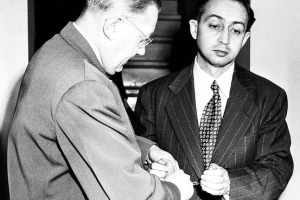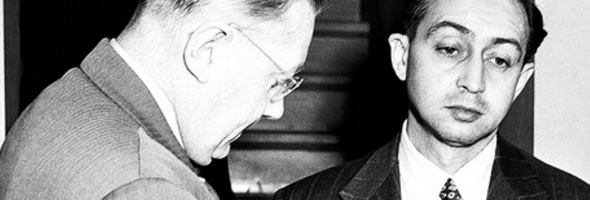
South Philadelphia was a tough neighborhood. Harry Gold thought the “fertile soil” of his “earnest desire” to work with the Soviet Union lay there, in his early experience of anti-Semitism:
“When I was about twelve I made regular trips to the Public Library at Broad and Porter Streets, a distance of about two miles from my home. On returning from one such trip I was seized by a group of about 15 gentile boys at 12th and Shunk Streets and was badly beaten.”
Gangs of Neckers, kids who lived in the marshy Neck section of South Philadelphia near the city dump “under extremely primitive conditions and amid the mosquitoes and dirt,” staged “brick throwing, window smashing, lightning forays” into Gold’s neighborhood, “their special hatred… directed at the Jews.”
Gold’s father, a hard and honest worker, was similarly harassed at the Victor Talking Machine Company where he was employed sanding radio cabinets. Immigrant workers who “were crudely anti-Semitic… made Pop, one of the few Jewish workers, the object of their ‘humor.’…” An Irish foreman in particular “who hated Jews far more bitterly than anyone Pop had ever encountered” assigned Sam to sand alone on a fast production line:
“So Sam Gold would come home at night with his fingertips raw and with the skin partially rubbed off. This was no exaggeration. Mom would bathe the fingers and put ointment on them and Pop would go back to work the next morning. But he never quit, not Pop, and he never uttered one word of complaint to us boys.”
“Many other such incidents could be described,” Harry Gold summarizes. “This was a scheme to which I built up a tremendous resentment throughout the years and a desire to do something active to fight and to combat it. Something on a much wider scale than by combat of an individual anti-Semitic.”
…
Gold got a new control [spy boss] in the fall of 1940, his favorite, Semen N. Semenov, an MIT graduate engineer, a man he would know only as “Sam.” … Sam was the only Soviet whom Gold ever met who might have passed for an American because of the way he spoke, dressed and acted, “and especially in the way in which he wore his hat. For some reason, foreigners never wear their hats as Americans do.”
…
But eventually [Abraham] Brothman came through. On a rainy evening in March 1942, he passed to Harry Gold a complete report on the manufacture of Buna-S synthetic rubber, including blueprints for a plant- several hundred single-spaced typewritten pages and a dozen blueprints. In April, Sam told Gold to congratulate and praise Brothman “because… the information he had turned over… had been received in the Soviet Union and had been hailed as a remarkable, extremely valuable piece of work… The Soviets were immediately beginning to set up a plant for the manufacture of Buna-S.”
Al Slack came through as well, though not before an accumulation of disappointments nearly led Gold to quit:
“Once, in the fall of 1942, I did waver. Things were going very badly. I lost contact with Al Slack… and things were going poorly with Brothman… and the whole business seemed futile. Also, at this time my increased absences from home had depressed my mother very much, and I was greatly concerned. To top it off, on that very evening in New York, the usually ebullient Sam had been very subdued regarding some failures of his own, and so, after I left him and went to Penn Station I came to the determination to be through with this work once and for all; I felt that I had done enough. I had some fifteen minutes for my train to Philadelphia and sat down in the smoking room of the station. Thereupon, I was approached by a swaying drunk who proceeded to vilify me as a “kike,” a “sheeny bastard” and a “yellow draft dodger and money grubber” plus a series of far more horrible epithets.”
Gold walked away. “But as I did so, so went my resolution to quit espionage work. It seemed all the more necessary to work with the utmost vigor, to fight any discouragement and to do everything possible to strengthen the Soviet Union, so that such incidents could not occur. To fight anti-Semitism here seemed hopeless.”
Part 1, Chapter 4

